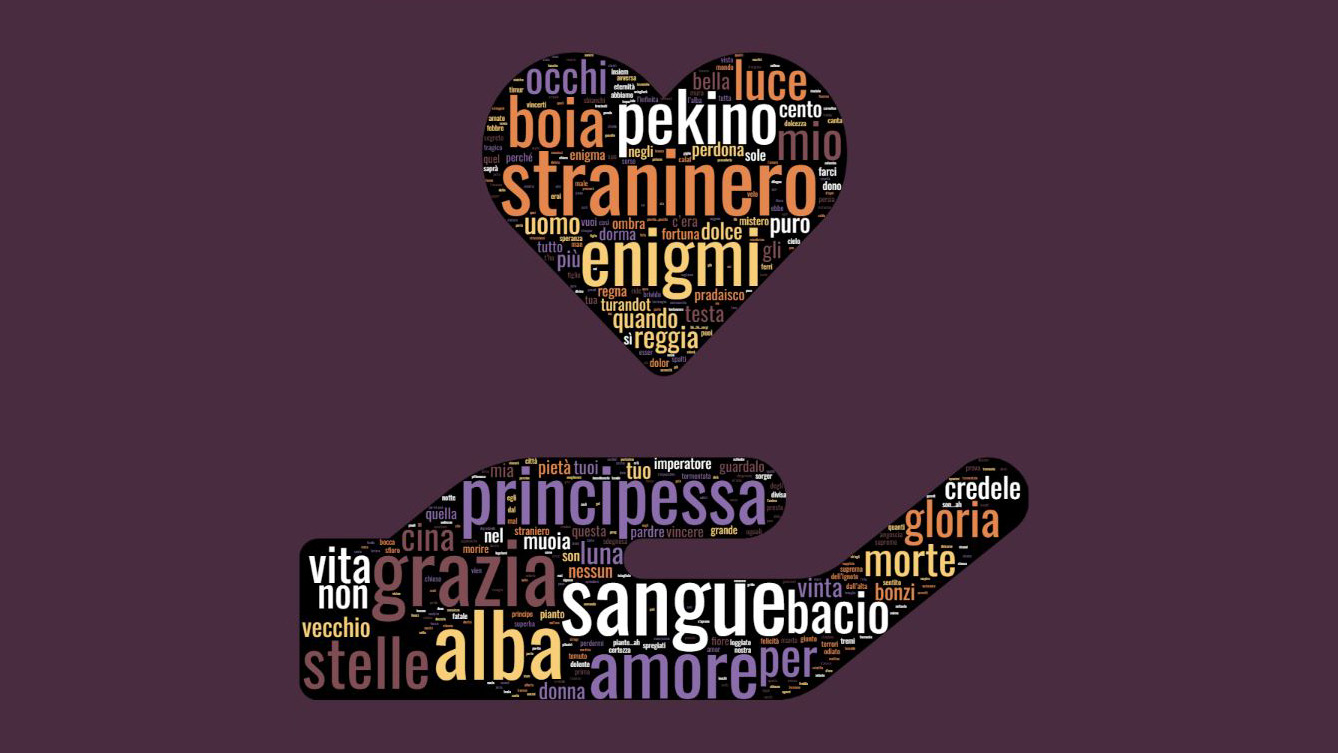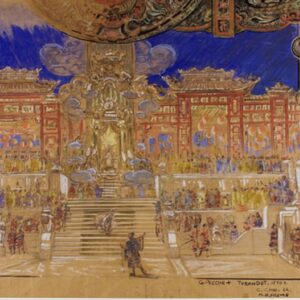Turandot 101—Top Ten Italian Words

By Angelica DiIorio
You might remember the repeated phrase “Buongiorno, principessa!” from the 1997 Academy Award-winning movie Life is Beautiful. Congratulations! You already know one of the most common Italian words in Puccini’s Turandot: principessa. Turandot is set in a fictional version of China, but the opera is sung in Italian because it was the native language of the composer, Giacomo Puccini.
Even though this opera is in Italian, you will still know exactly what is going on without being fluent in the language. There are subtitles at every seat in English and Spanish and English supertitles above the stage. You can also read the plot of Turandot ahead of time.
Learn the story with Turandot 101 – Characters and Plot>>
However, if you want to get a little closer to the art, you can learn some Italian words with us. Read on to explore a few of the most common words that appear in Turandot and learn the Italian equivalent. You might even start to recognize the words as they are sung.
Tickets to Puccini’s Turandot start at just $39 and are going quickly! Get yours today>>
Italian Word #1 in Turandot: Alba (n.) – meaning dawn
Turandot’s reign is one of precision and harsh order. She sets many deadlines for her people like “Kill this suitor when the moon rises,” or “Learn this stranger’s name by dawn.” Dawn is the deadline by which Turandot must learn the name of her mysterious suitor (Calàf). However, it also represents the literal and figurative dawn of a new day when Turandot’s heart is softened by love and a more peaceful time is ahead.
Italian Word #2 in Turandot: Amore (n.) – meaning love
How could you make it more than a few minutes into an opera without talking about love? Many suitors come to woo Princess Turandot, but she has no interest in love. When the clever Calàf changes her mind, Turandot declares that his name is Love itself!
Italian Word #3 in Turandot: Boia (n.) – meaning executioner

Yikes! What kind of story talks about executioners this much? Don’t worry—you don’t see anything gruesome in this opera, but there are some off-stage deaths. Turandot challenges her suitors to answer three riddles. If a man answers correctly, he gets to marry her. If not, he loses his head! The crowd calls for the executioner Pu-Tin-Pao to do his work.
Italian Word #4 in Turandot: Enigmi (n.) – meaning riddles
Riddles are pervasive in the story of Turandot. Suitors must answer three correctly to marry the princess. Turandot does not expect anyone will answer all her riddles correctly. Since she does not want to be married, believing she would lose her independence if she does so, she deliberately makes the riddles challenging. She is quite shocked when Calàf manages to pass her tests.
Italian Word #5 in Turandot: Grazia (n) – meaning mercy
As you have probably gathered, Turandot’s reluctance to marry causes cruelty towards her suitors and panic in her people. Many, including her father the Emperor, frequently plea with her to show mercy. The Prince of Persia, a suitor who failed to correctly answer the riddles, is set to die in front of a crowd. Upon seeing this innocent youth, the crowd begs the princess to reconsider her death sentence. Emotionlessly, she refuses; mercy will come later.
Italian Word #6 in Turandot: Nome (n.) – meaning name
Much to her shock, Calàf correctly answers Turandot’s riddles. She is distraught, so Calàf gives her a riddle of his own: she must guess his name before sunrise. Everyone is under Turandot’s orders to discover the name, but Calàf insists no one will discover his secret in “Nessun dorma.”
Check out “Nessun dorma,” sung by opera legend, Luciano Pavarotti.
Italian Word #7 in Turandot: Principessa (n.) – meaning princess
Turandot is the princess of Peking in a fictionalized version of ancient China. Like many princesses, Turandot is described as beautiful, but her royal title also gives her a tremendous amount of power. Turandot’s word is rule, so it’s best to get on her good side.
Italian Word #8 in Turandot: Sangue (n.) – meaning blood
There is much bloodshed during Turandot’s reign. The crowds, the ministers, and the Emperor lament the number of people killed under her orders. One of the most tragic deaths is Liù’s. She knows Calàf’s name but refuses to share it. Instead, Liù chooses to die before being forced to divulge his secret, and Calàf is distraught that the purest of blood (purissimo sangue) was spilled.
Italian Word #9 in Turandot: Straniero (n.) – meaning stranger
For much of the story, Calàf goes unnamed. In fact, in the libretto itself, he is often referred to simply as “the unknown prince,” since his name is only revealed in the last few minutes of the opera. Calàf is a prince fleeing his own kingdom for his safety, so he has the veil of anonymity when he arrives in Turandot’s. Many people, from Turandot herself to the crowds to the ministers, address Calàf as “stranger.”
Italian Word #10 in Turandot: Vita (n.) – meaning life
It’s love at first sight for Calàf when he meets Turandot. However, those around him discourage his lovestruck gaze and try to explain persuing her only leads to death. The ministers especially encourage him to choose life because “la vita è bella!” (life is beautiful!) Of course, Calàf ignores them, believing his life now needs to include this beautiful princess.
—
Che bello! You’re practically an expert on the Italian words in Turandot. Tickets are going quickly, so make sure to get yours today to impress your guests with your knowledge of Italian words.
Tickets start at just $39 for performances of Puccini’s Turandot from May 6 to 14>>
Did you recognize any of these words from your Italian studies? Let us know in the comments below.
You can also learn more Italian words by checking out the top ten Italian words in Rigoletto>>


